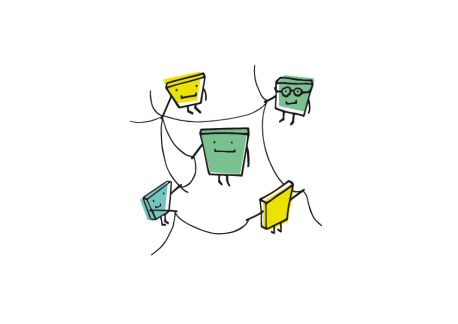For these two semi-structured interviews with professionals involved in social projects, I was interested in how they use, view, and feel the impact of digital technology in their work. I kept the scope broad enough to include any digital technology that they use as a tool, that they develop/create/implement, or that they communicate with, educate about, work on countering etc.
The participants were relevant to the research through their occupations. One of them works in the development of a tech product promoting individual responsibility for environmental impact, and the other conducts communication for humanitarian organisations.
Both interviews lasted for a bit over 30 minutes.
First contact
I found out about a local WhatsApp group called “Social Impact Network Barcelona” with over 500 members. The messages in the group vary from awareness raising about social causes, local protests, community organising, networking, sahring events, advertising etc.
I posted the following message in the group:
Hello, everyone.
I am trying to find someone for an 1-hour in-person interview about social issues and digital technology. The topic is broad, so various profiles would be suitable.
Are you someone who does social media for an NGO or community organisation,
or someone who works on digital literacy,
someone studying social siences and digital technology,
or someone whose life/environment is impacted by digital technology etc.?
I’m doing the interview for a Media Strategies and Methodology course, part of the master’s program “Communication for Development” at Malmö University. The interview would be published in written form on a student blog. Outside of my studies, I’m working for a tech company in Barcelona.
If you are interested or have any questions, please contact me. The interview would be in-person, in Barcelona, and take 1 hour.
Thank you!
Three people answered the request, one of whom did not follow through, and I interviewed the other two.
One of the interviews took place through Google Meet, and one in person. I explained the purpose and scope of the interview as follows:
The main points I would ask about:
- The role of digital technology in the projects you participated in.
- The use of digital platforms in social impact projects (methods, challenges, metrics for success).
- What you find as a key issue on the topic, in your work.
The objective for the interview would be to examine the use and impact of digital technology in social impact projects.
We can also explore other topics based on our conversation.
The meta-objectives within my study programme is to apply and reflect on the research methodology for in-person interviews vs call interviews.
With the participants’ consent, I recorded the audio of the interviews, and I informed them the interview would be anonymous and that I won’t publish the recording, only, potentially, the transcript.
The Interviews
- Research question
- How do social responsibility projects relate to digital technology?
- Key concepts
- Social responsibility projects – any development, humanitarian, social justice project or initiative, be it initiated or funded by institutions, NGOs, charities etc.
- Digital technology – software, devices, platforms, social media, tech companies, types of work involving these.
- Interview questions There were three main questions, with an introductory question and a closing question. I also asked supplementary questions to clarify or further understand an answer. I also allowed the participants to ask clarifying questions about the interview and the questions.
- Intro: What roles did you have in your work on social projects and digital technology?
- What digital technology tools do you use in your social responsibility projects and what role do they play?
- What metrics of success for social impact do you use in your project? What do you consider a success in your work?
- What ethical challenges do you face in your role? What are the best practices for this?
-
- Outro: What do you think key issue or challenge in the use of digital technology in social responsibility projects?
The rapport during the interview
The incentive for the participants at the interview was two-fold. On the one hand, it comes from a desire to network professionally, and on the other hand, it stems from the participants’ generosity to provide their time for someone studying a topic close to their professional field.
With Participant 1 I had a Google Meet interview. As they work in a tech company that transitions from charity work into a “purpose for profit” company, and as I work in a tech company myself, we were able to establish a rapport based on a common understanding of working with developers, sharing common concepts and language (industry-specific jargon), sharing preferences over software tools and industry practices. This commonality allowed me to show an understanding of the situations and processes described in the interview.
With Participant 2 I had an in-person interview. When deciding on the place to meet, I expressed my flexibility to go to a location close to them, and the participant invited me into their home. We conducted the interview on their terrace, a very comfortable environment for the participant. They were welcoming and offered me tea, which I refused, but turned into a bonding conversation about caffeine intake. As the participant works in communicating different development and social projects, we also were able to establish a rapport based on a common preoccupation with and general knowledge of humanitarian topics and current events.
In both interviews, I maintained and showed interest, and expressed approving or encouraging interjections along the way (“hmm”, “yeah”, “I see”, “oh, that’s interesting”).
I don’t think there was an impactful power imbalance between the participants in myself. We seemed to belong to similar age groups, have common interests, and have similar socio-economic positions. I conducted the interviews in English, a language in which both the participants are fluent, with the first participant being a native speaker, and the second not. I don’t feel the language impacted the interview.
Differences between the two interviews
During the online interview, there was sometimes a need to clarify some words or spell out the proper name of a software. As the participant was sick, they seemed to find it useful to be able to mute themselves while coughing.
I wasn’t able to read the participant’s body language. Seeing only their shoulders and head, at certain points, I wasn’t sure if they were reticent to a line of questioning, or if what I took for suspicion was actually their neutral way of expressing themselves. Not having the body language to try and corroborate this type of supposition, left me uncertain on this point.
In the in-person interview, I was able to notice the body language of the participant, which seemed open and relaxed. Given we were on their terrace, the participant seemed to be comfortable and passionate about the topic of the interview. For this interview I changed the order of questions (asking question 3 about ethical concerns second, and question 2 about success metrics third), due to the organic flow of conversation. In the in-person interview, the answer to question 1 ended on a topic related to ethical concerns, therefore I decided to ask the question on this topic next.
Given the difference in the type of work each participant did, they each interpreted the questions in different ways. For example, Participant 1 considered ethical challenges involved in their own activities and decisions (trying to avoid greenwashing), and Participant 2 discussed the ethical issues in the external context of their work (the risk of targeting individuals through data tracking by companies and totalitarian governments). This difference of interpretation is informative in itself to inform the research question. As long as it is accounted for in interpreting the qualitative data, allowing a high degree of freedom for the participant to interpret the question can provide a higher variety of perspectives.
Personal learnings and relation to professional or academic writing practices
The participants needed to clarify some of the questions, particularly what key concepts like digital technology meant in the context of the question. With more iterations, the interview questions could be clarified further. The lack of clarity here was caused by the broad topic. Perhaps the broad research question could be addressed with more specific interview questions.
I found myself rephrasing parts of the questions into a more familiar language. It may be a good idea to phrase the questions from the start in a non-overtly formal manner that could be easily understood, but that still maintains the conciseness and professional language necessary for the qualitative research.
In both interviews, the answers were sprawling and quite general. Sometimes it is necessary to intervene to steer the conversation back on topic. At the same time, a tangential topic opened by the participant can reveal interesting issues that may be relevant to the research. In this case, it is an opportunity to ask further questions about the tangential topic. It would be helpful to prepare an outline of possible types of answers in order to map them afterwards or guide them during the interview so that they better address the research question.
Image: SynLLOER, CC0, via Wikimedia Commons.

